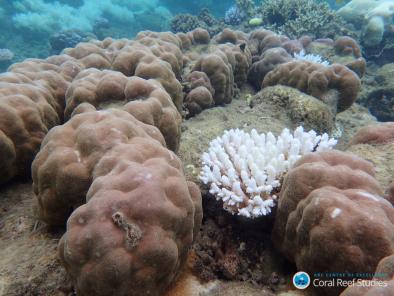Science Source
Bleaching drives collapse in reef carbonate budgets and reef growth potential on southern Maldives reefs
- States that sea-surface temperature (SST) warming events represent major threats to coral reefs
- Quantifies the magnitude of changes that followed the ENSO-induced SST warming that affected the Indian Ocean region in mid-2016
- Finds that resultant coral bleaching caused an average 75% reduction in coral cover (present mean 6.2%)
- Reports shifts in shallow fore-reef carbonate budgets from strongly net positive (mean 5.92 G, where G = kg CaCO3 m−2 yr−1) to strongly net negative (mean −2.96 G)
- Finds that these changes have driven major reductions in reef growth potential, which have declined from an average 4.2 to −0.4 mm yr−1
- Concludes that these shallow fore-reef habitats are now in a phase of net erosion
- Predicts a prolonged period of suppressed budget and reef growth states
Related Content
Headline

Apr 18, 2018 | Washington Post
Global warming has changed the Great Barrier Reef ‘forever,’ scientists say
Science Source
| World Weather Attribution
Great Barrier Reef Bleaching, March 2016
Science Source
| Proceedings of the National Academy of Sciences
Ocean acidification affects coral growth by reducing skeletal density
Nathaniel R. Mollica, Weifu Guo, Anne L. Cohen et al
Science Source
| PLOS ONE
Coral physiology and microbiome dynamics under combined warming and ocean acidification
Andréa G. Grottoli, Paula Dalcin Martins, Michael J. Wilkins et al


